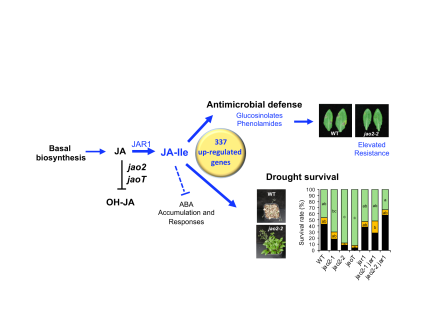In a study of jasmonate (JAs) metabolism, researchers from IBMP have identified the mode of regulation of a wide renage of adaptative responses to environmental stresses. JAs form a complex group of hormonal compounds, where jasmonic acid (JA), the inactive precursor, can be modified enzymatically to various derivatives whose functions are poorly known. JA conjugation to isoleucine generates the active hormone jasmonoyl-isoleucine (JA-Ile), a master regulator, whose perception de-represses transcritpional responses at the basis of adaptation mechanisms.
After their initial characterization of JA-Ile catabolic pathways in Arabidopsis thaliana, the researchers had identified novel oxydases named JAO (for Jasmonic Acid Oxidases) that metabolize JA upstream of JA-Ile formation, thereby repressing JA-Ile dependent responses when stress is absent. Conversely, genetic suppression of JAO2, one of the isoforms involved, increases basal expression of defense markers and ensures a much stronger resistance to the pathogenic fungus Botrytis cinerea.

In a new development, the team has explored the global changes at the transcriptome and metabolome levels in the jao2 mutant. They identified about 340 genes whose expression is upregulated in leaves and direct the permanent synthesis of a wide range of proteins and defensive metabolites, underlying the elevated pest resistance. Furthermore, this list also includes several transcription factors linked to hydric stress tolerance, and consistently, a severe drought assay has revealed a much stronger survival rate of jao2 mutants. The mechanism involved is still elusive, but does not seem to recruit stronger activity of abscisic acid, the classical drought response hormone in plants. These findings demonstrate that a targeted modification of jasmonate metabolism allows to elevate basal levels of defense and adaptation programs, providing a broad-spectrum protection to environmental stresses. They open interesting perspectives to breed better tolerance in crop species.
This study directed by Thierry Heitz in the team Evolution and Diversity of Plant Metabolism was published in The Plant Journal on 22 November 2021.















